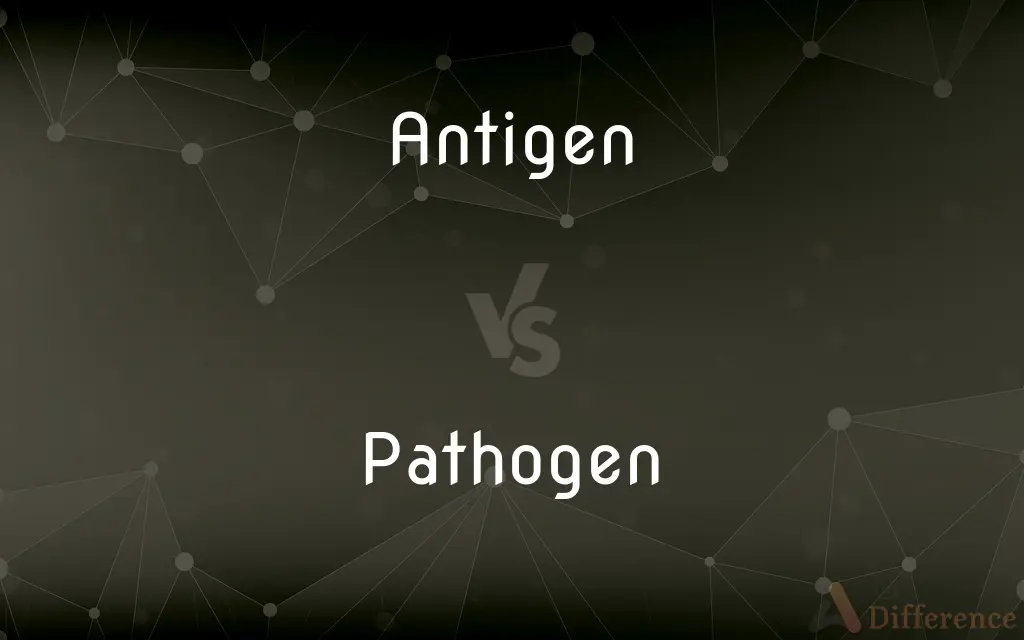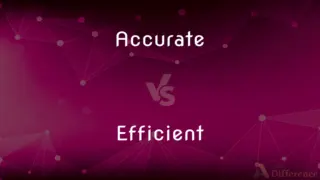Antigen vs. Pathogen — What's the Difference?
By Maham Liaqat & Fiza Rafique — Updated on April 23, 2024
Antigens are molecules capable of triggering an immune response, often part of pathogens; pathogens are organisms that cause disease in their hosts.

Difference Between Antigen and Pathogen
Table of Contents
ADVERTISEMENT
Key Differences
Antigens are typically specific parts of pathogens such as proteins or polysaccharides that are recognized by the immune system, while pathogens are the actual microorganisms, like bacteria and viruses, that can cause diseases. Antigens can be a part of pathogens or non-pathogenic entities, whereas pathogens always have the potential to cause disease.
Antigens prompt the body to produce antibodies as a defense, while pathogens are the invaders that disrupt normal bodily functions. The immune system identifies and attacks antigens in an effort to neutralize the threat posed by pathogens.
While antigens are not always harmful and can include substances like pollen or food proteins that simply trigger allergic reactions, pathogens are explicitly harmful, causing infections and diseases in their hosts.
Antigens are used in vaccines to elicit an immune response without causing disease, whereas pathogens are often attenuated or killed to form these vaccines. This shows how antigens can be manipulated for health benefits, unlike the generally harmful nature of pathogens.
Antigens vary widely in structure and can be present on the surface of cells or within cells, depending on their origin and role. Pathogens, on the other hand, are living entities that multiply and spread within their host, showing much more complex interactions with the host.
ADVERTISEMENT
Comparison Chart
Definition
Molecules that elicit an immune response.
Microorganisms that can cause disease.
Role in Immunity
Trigger the production of antibodies.
Cause diseases that the immune system fights.
Examples
Pollen, egg white proteins, bacterial toxins.
Bacteria, viruses, fungi, protozoa.
Harmfulness
Not inherently harmful.
Inherently harmful.
Usage in Medicine
Used in vaccines to simulate immune response.
Studied to develop treatments and vaccines.
Compare with Definitions
Antigen
Components of pathogens recognized by immune cells.
During an infection, bacterial antigens are targeted by white blood cells.
Pathogen
An organism that causes disease in its host.
Streptococcus pneumoniae is a pathogen responsible for pneumonia.
Antigen
Non-microbial substances that can cause allergies.
Pollen antigens can cause severe allergic reactions.
Pathogen
Microorganisms that can lead to infections.
HIV is a pathogen that attacks the immune system.
Antigen
Any molecule that can bind to an antibody.
Blood type antigens determine blood compatibility.
Pathogen
Can be spread through various means, including water, air, and physical contact.
Pathogens like the norovirus spread rapidly in enclosed environments.
Antigen
A substance that induces an immune response in the body.
The presence of the flu virus antigen in the body triggers antibody production.
Pathogen
Often microscopic organisms, including bacteria and viruses.
Common cold pathogens spread easily among people.
Antigen
Substances used in vaccine development to elicit immunity.
Vaccine formulations often use purified antigens to ensure safety.
Pathogen
Studied for their role in disease mechanics and prevention strategies.
Researchers study pathogens to develop effective treatments and vaccines.
Antigen
In immunology, an antigen (Ag) is a molecule or molecular structure, such as may be present on the outside of a pathogen, that can be bound by an antigen-specific antibody or B-cell antigen receptor. The presence of antigens in the body normally triggers an immune response.
Pathogen
In biology, a pathogen (Greek: πάθος pathos "suffering", "passion" and -γενής -genēs "producer of") in the oldest and broadest sense, is any organism that can produce disease. A pathogen may also be referred to as an infectious agent, or simply a germ.
Antigen
A toxin or other foreign substance which induces an immune response in the body, especially the production of antibodies.
Pathogen
An agent that causes disease, especially a virus, bacterium, or fungus.
Antigen
A molecule that is capable of binding to an antibody or to an antigen receptor on a T cell, especially one that induces an immune response. An antigen is usually a foreign substance, such as a toxin or a component of a virus, bacterium, or parasite.
Pathogen
Any organism or substance, especially a microorganism, capable of causing disease, such as bacteria, viruses, protozoa or fungi. Microorganisms are not considered to be pathogenic until they have reached a population size that is large enough to cause disease.
Antigen
(immunology) A substance that induces an immune response, usually foreign.
Pathogen
Any microorganism which causes disease; a pathogenic organism; an infectious microorganism; a bacterium, virus, or other agent which can cause disease by infection; - opposed to zymogene. The spelling pathogene is now archaic.
Antigen
Any substance (as a toxin or enzyme) that stimulates the production of antibodies
Pathogen
Any disease-producing agent (especially a virus or bacterium or other microorganism)
Common Curiosities
How do antigens relate to pathogens?
Antigens are often components of pathogens, recognized by the immune system as targets.
Can antigens be non-pathogenic?
Yes, antigens can come from non-pathogenic sources, such as pollen or food proteins that cause allergies.
How are pathogens transmitted?
Pathogens can be transmitted via various routes, including airborne particles, direct contact, or contaminated water and food.
How does the immune system respond to antigens?
The immune system responds by producing antibodies that specifically target and neutralize antigens.
What makes a pathogen harmful?
Pathogens are harmful because they invade hosts and disrupt normal cellular functions, leading to disease.
Are antigens visible to the naked eye?
No, antigens are microscopic and cannot be seen without specialized equipment.
What is a pathogen?
A pathogen is any organism that can cause disease, such as bacteria, viruses, or fungi.
Can antigens be used in medical treatment?
Yes, antigens are used in vaccines to safely trigger immune responses without causing disease.
What role do antigens play in vaccines?
Antigens in vaccines help the body learn to recognize and fight pathogens without causing the disease.
What diseases are caused by pathogens?
Pathogens cause a wide range of diseases, from common colds to more severe illnesses like tuberculosis.
What is an antigen?
An antigen is a molecule that can trigger an immune response, particularly by inducing the production of antibodies.
Can pathogens survive outside a host?
Some pathogens can survive outside a host for various periods, depending on environmental conditions.
Are all pathogens bacteria?
No, pathogens can be bacteria, viruses, fungi, or protozoa, among others.
How do scientists study pathogens?
Scientists study pathogens by isolating them, studying their genetics, and understanding how they infect hosts to develop treatments and preventive measures.
Do all antigens lead to disease?
No, many antigens trigger immune responses without causing disease, such as those involved in allergies or used in vaccines.
Share Your Discovery

Previous Comparison
Compassion vs. Kindness
Next Comparison
Accurate vs. EfficientAuthor Spotlight
Written by
Maham LiaqatCo-written by
Fiza RafiqueFiza Rafique is a skilled content writer at AskDifference.com, where she meticulously refines and enhances written pieces. Drawing from her vast editorial expertise, Fiza ensures clarity, accuracy, and precision in every article. Passionate about language, she continually seeks to elevate the quality of content for readers worldwide.












































